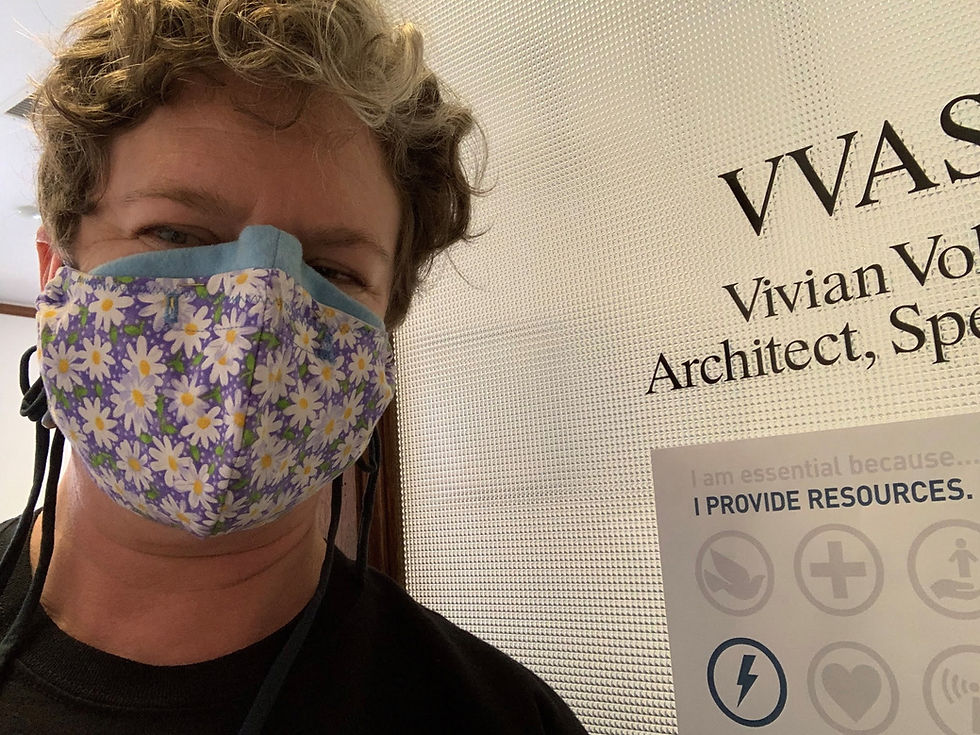Anderson Todd's Most Valuable Lesson
- Vivian Volz
- Aug 31, 2012
- 3 min read
Anderson Todd taught my freshman architecture class in the fall of 1986 at Rice University. It might have been his last freshman studio - he was, at that point, everything people mean when they say crotchety old codger: harsh, grouchy, sometimes profane, and very critical. And I was a naïve, teacher-pleasing girl from the top ten graduates of my suburban high school. I never thought he'd be the professor to whom I'm most grateful, for a fundamental life lesson.
In my tiny world, Andy Todd seemed shockingly sexist. Being eighteen, in 1986 in Texas, meant navigating my own changing ideas about gender roles at the same time the Southern woman was still trying to decide whether to be pleased or insulted if a man opened a door for her. And Andy Todd had been in architecture a long time, starting when a woman would almost certainly have been a secretary getting the coffee and typing the cover letters. He seemed to me to talk down to the women in class, to thumb his nose at anything feminine. Later, when I was a junior, he revealed that he actually had a lot of respect for women as architects, because he saw us as hard-working, persistent, and dedicated. As a freshman, though, I saw him as someone who didn't want me in his class or in his profession.
It's hard to please a professor like that, even when the assignments are easy. But these were exercises I'd never seen the like of - not in art class, not in science or math, and definitely not in senior English, where I'd received a B on an A paper because the teacher couldn't, theologically, condone it. And that paper had been the extent of my rebellion, too: if the scariest thing I'd ever done, besides miss curfew, was present a paper on Joan of Arc to a Baptist, clearly rebellion was not in my nature.
But Andy (yes, we always called him Andy, certainly never Professor Todd) taught me the single most valuable thought that I learned in all of my college experience. The exercises, you see, were to explore line, two-dimensional form, contrast, and positive and negative space - all the basic elements of design - without regard for result. And result was what I'd always used to measure my work. If the desired outcome is an A, then I needed criteria for that A. And then, I expected to try to meet those criteria. How, if the criterion is "explore", do I know if I've achieved the result? I was mystified.

I was frustrated by assignment after assignment: centimeter-long pencil lines, exploring the spaces between them... connecting two points with any line, yes, really, any line... white squares to be 50% covered by black. I did not understand, and the crotchety old codger probably tried to tell me a thousand times that he could not tell me what the solution was supposed to be. I remember tears, though I'm not sure how many of them he saw.
One day, though, one very bad day in February, he seemed to realize that I was simply not progressing in this concept of exploration. He sat down next to me at my desk, as the rest of the studio was out gathering leaves for a still-life exercise. He told me I was approaching the exercises as if there were a finite solution, like a calculus problem, or an imitation solution, like writing an essay just like the one the teacher would have written. I had to stop trying to please the professor, stop trying to get a good grade.
I'm sure he had said some variant of this before, but this time it clicked. Pleasing the professor was not the goal! Learning to design was the goal! In order to design, one has to explore the elements, without knowing or even caring what the outcome would be. Sure, I had some creativity in me, but the teacher-pleaser part of me had been smothering it. Being told by my professor that I had to stop trying to read his mind, to stop caring what he thought: mind-blowing! He had just changed my neat little view of school from delivery to learning. And, in the process, he stuck a wedge into the very tight relationship between me and authority.
If I could carry one piece of understanding back in time to a younger self, even after all these years of experience since, I think I would still choose this piece -- that pleasing the teacher is not the goal of school, nor is it true learning.




Comments